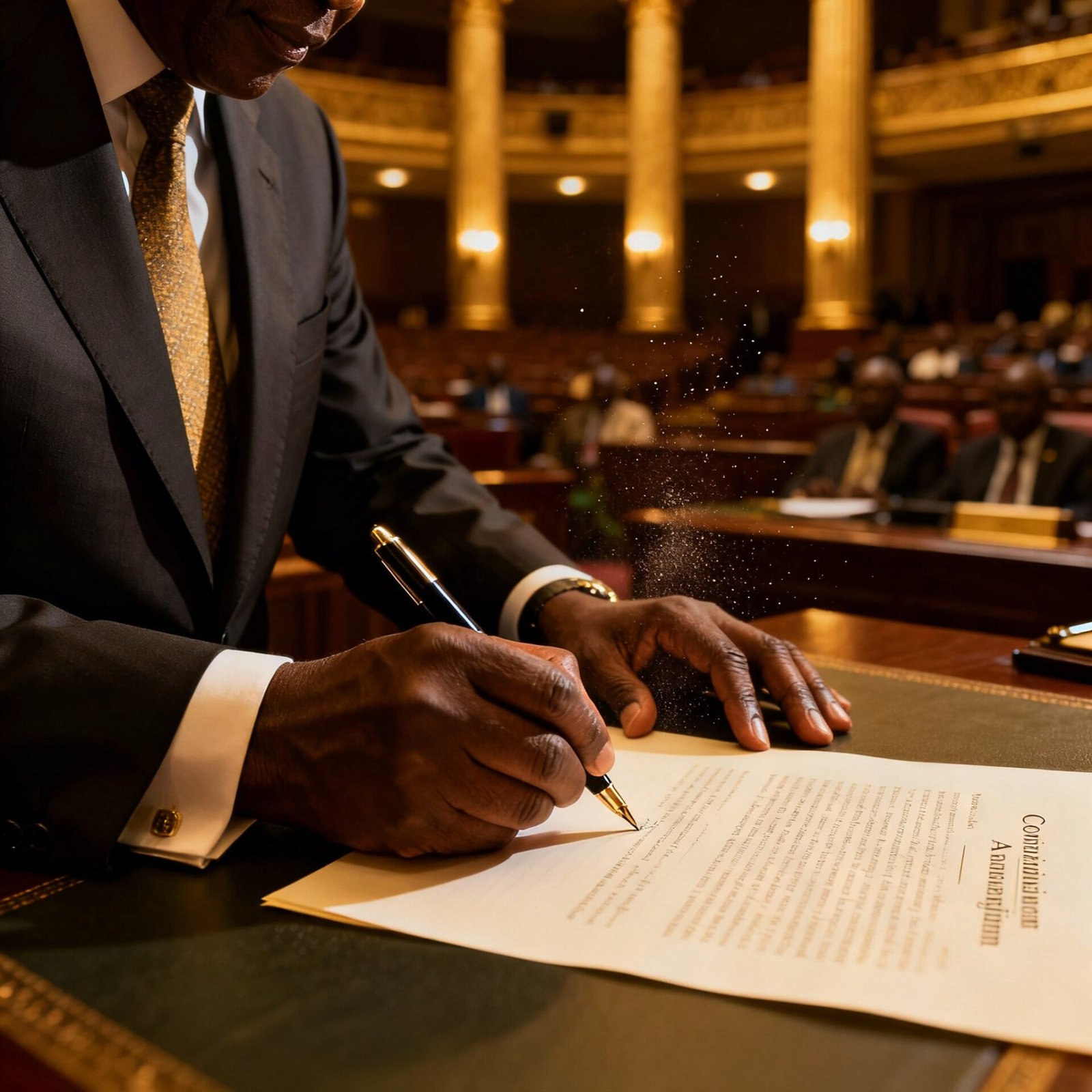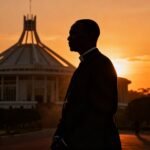Across Africa, a silent coup is underway. Not through tanks rolling down capital city streets or midnight arrests, but through constitutional amendments passed in marble-floored parliament buildings. From Kampala to Lomé, from Kigali to N’Djamena, presidents are rewriting the fundamental laws of their nations to ensure they never have to leave office.
This investigation reveals how constitutional term limits in Africa once heralded as the cornerstone of African democracy are being systematically dismantled through legal sleight of hand, rigged referendums, and parliamentary manipulation.
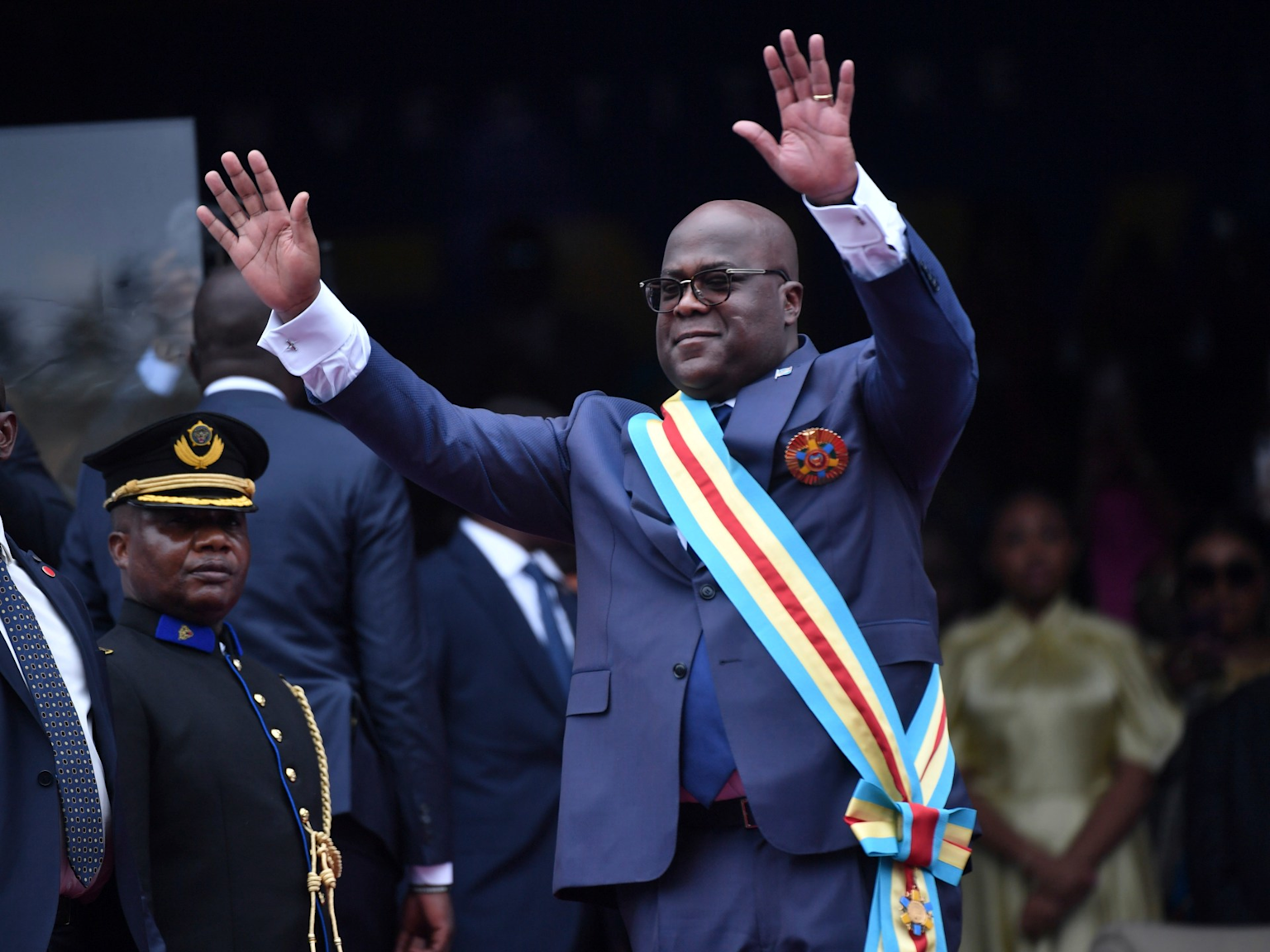
The evidence is stark: 30 out of 54 African countries now operate without functioning limits on executive power, representing 56% of the continent. This marks a dramatic reversal of democratic progress made between 2000-2015, when African leaders increasingly respected constitutional term limits. Since 2015, however, leaders in 14 countries have successfully evaded these restrictions, while military coups in another eight nations have suspended constitutional governance entirely.
The Mathematics of Democratic Erosion
The numbers tell a devastating story about Africa’s democratic regression. Among the 18 countries that still uphold term limits, leaders average just 5 years in office. In contrast, the 14 leaders who have evaded these restrictions have remained in power for a median of 16 years—and when considering regime continuity rather than individual tenure, that figure jumps to 26 years.
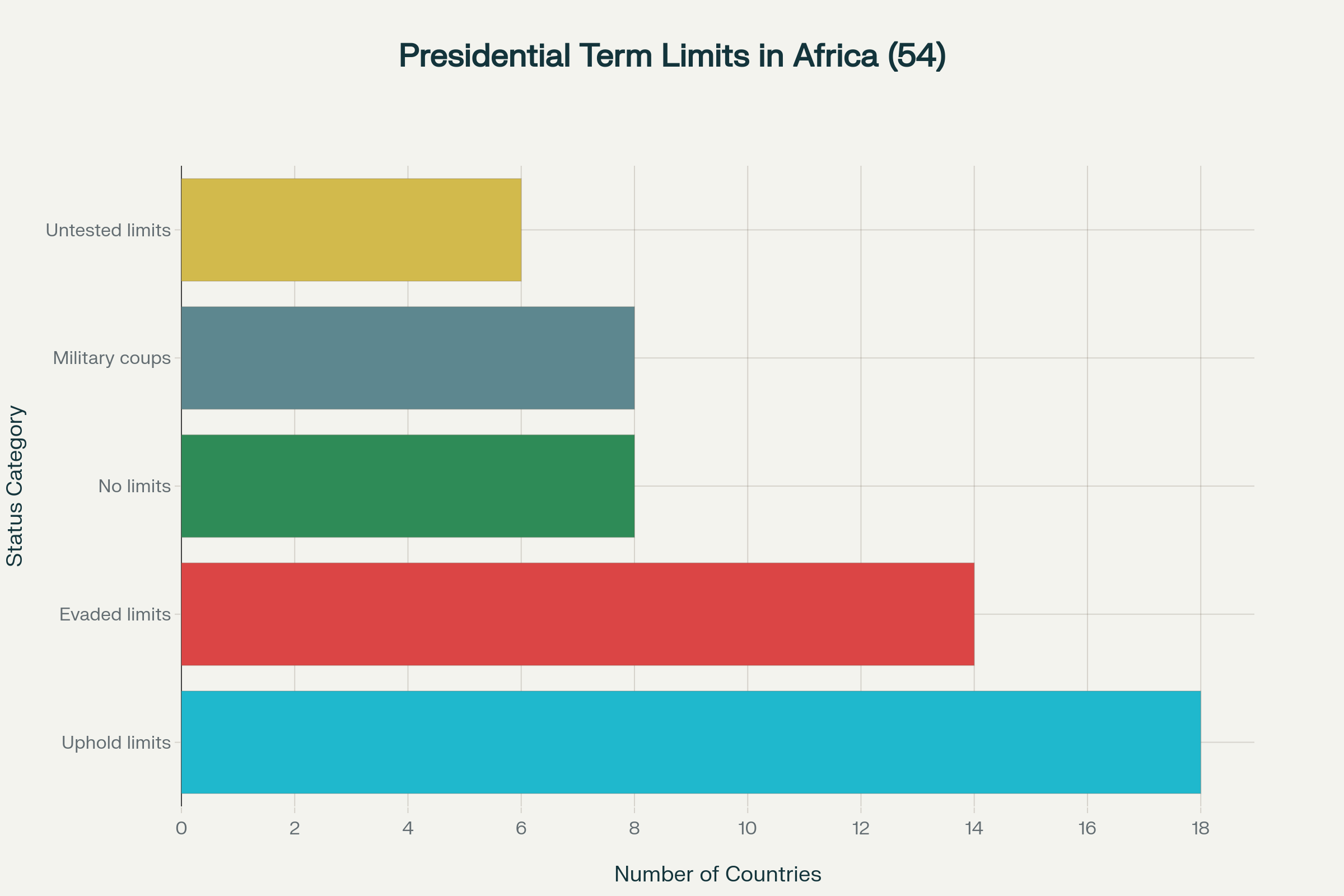
The correlation between extended rule and governance failures is unmistakable. Countries that uphold term limits score a median of 65 on Freedom House’s Global Freedom Index, compared to just 21 for nations where leaders have evaded these limits. On Transparency International’s Corruption Perceptions Index, term-limit-respecting countries rank 83rd globally on average, while term-limit evaders rank 142nd—a 60-place difference that represents billions in lost development funds.
Methods of Constitutional Manipulation
African leaders have developed sophisticated techniques for circumventing term limits while maintaining a veneer of legality. Research by the Global Governance Africa institute identifies four primary methods:
Complete Abolition: Leaders eliminate term limits entirely, as seen in Guinea (2001), Togo (2002), Uganda (2005), Algeria (2008), Cameroon (2008), and Djibouti (2010).
Term Extension: Rather than removing limits, leaders extend the length of presidential terms. Guinea extended from five to seven years in 2001, followed by the Democratic Republic of Congo (2002), Rwanda (2003), Burundi (2018), and Chad (2018).
Constitutional Reset: New constitutions are adopted that reset the presidential term clock, allowing incumbent leaders to argue that previous terms don’t count. This occurred in Zimbabwe (2013), the DRC (2015), and Rwanda (2015).
Indirect Power Transfer: The most sophisticated approach involves shifting to parliamentary systems while ensuring the president becomes prime minister or council president, as recently implemented in Togo.
Case Study: Togo’s Parliamentary Gambit
Togo’s 2024 constitutional revision represents the most innovative term limit evasion in recent memory. President Faure Gnassingbé, whose family has ruled for 57 years, orchestrated a shift from presidential to parliamentary governance that eliminates direct presidential elections.
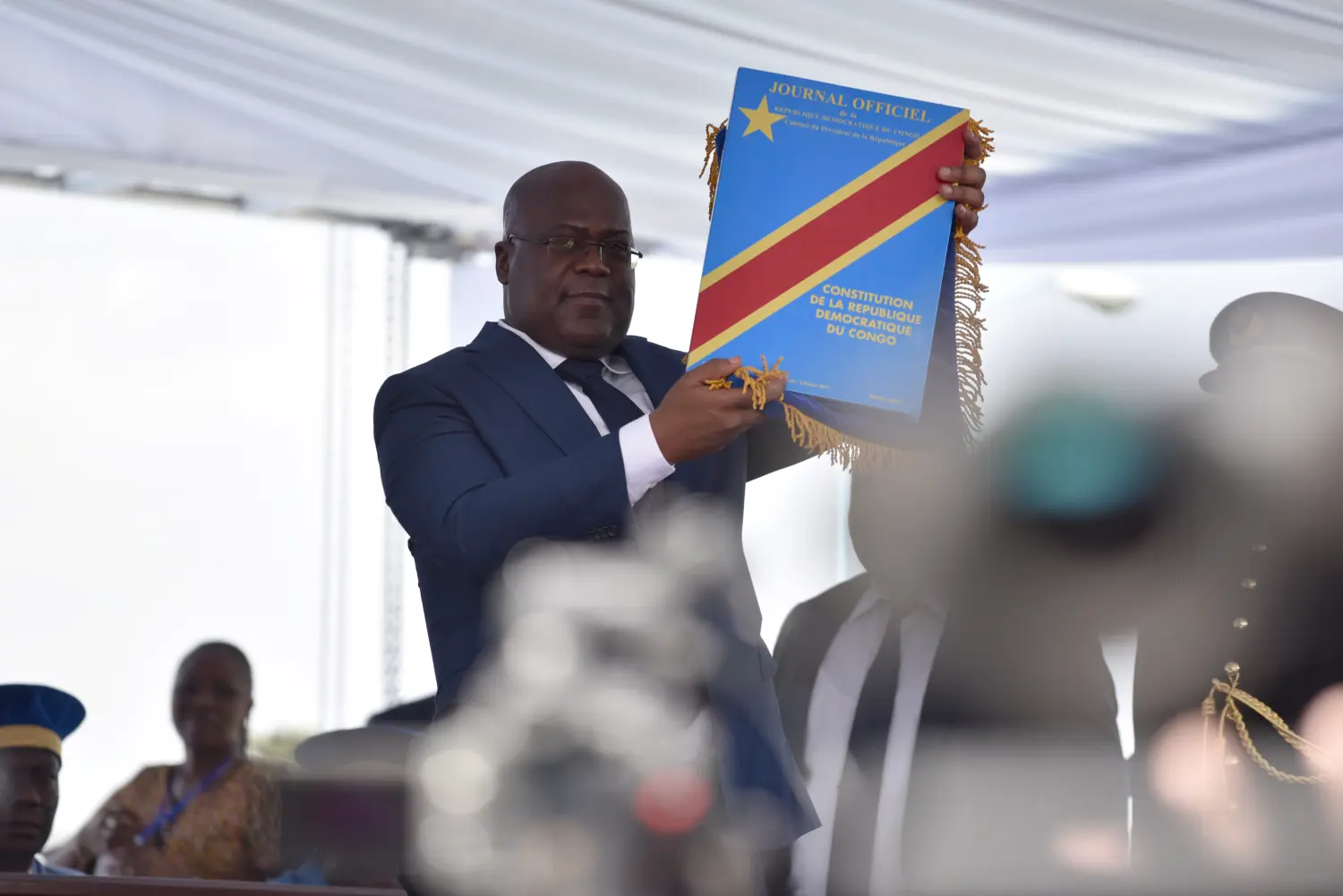
Under the new system, parliament elects the president, who becomes largely ceremonial, while real power rests with the “President of the Council of Ministers”—a position tailor-made for Gnassingbé. The constitution establishes a single six-year term limit, but crucially, Gnassingbé’s nearly two decades in office don’t count toward this limit.
Koffi Amessou Adaba, a researcher on Togolese institutional democratization, describes the changes as “so comprehensive that it is more accurate to refer to it as a radical overhaul rather than a simple amendment”. Opposition leaders denounced it as a “constitutional coup,” but Gnassingbé’s party controlled parliament after the opposition boycotted 2018 elections due to alleged irregularities.
The timing was strategic. The reforms were passed just days before legislative elections, effectively locking in ruling party control while opposition forces were divided. In May 2025, Gnassingbé was officially inaugurated as “President of the Council of Ministers,” a role with no term limits that his critics say allows him to “rule for life”.
Rwanda: The Referendum Model
Rwanda’s 2015 constitutional referendum established a template for legitimizing term limit extensions through popular vote. President Paul Kagame orchestrated a campaign that garnered over 3.7 million signatures—equivalent to 60% of registered voters—calling for constitutional amendments.
The referendum, held on December 18, 2015, approved the changes with 98.32% support. However, the Democratic Green Party’s attempt to challenge the amendments was rejected by the Supreme Court, which ruled that “it’s normal to change the constitution in Rwanda and any other country as long as it’s through a referendum”.
The amendments allow Kagame to serve one more seven-year term and then two additional five-year terms, potentially keeping him in power until 2034. In 2023, Kagame confirmed he would run for a fourth term, dismissing Western criticism with the statement: “I’m sorry for the West, but what the West thinks is not my problem”.
Frank Habineza, leader of the Green Democratic Party and Kagame’s only serious opponent, received just 0.45% of votes in 2017. He argues that “there is a high level of poverty and people have no food and youth have no jobs. This is what bothers Rwandans,” but Freedom House describes Rwanda as “not free” and notes that the ruling party has been “banning and repressing any opposition group that could mount a serious challenge”.
Uganda: The Age Limit Stratagem
Uganda provides the clearest example of progressive constitutional erosion. President Yoweri Museveni has overseen two separate constitutional amendments to ensure his continued rule, demonstrating how leaders adapt their strategies as circumstances change.
In 2005, parliament removed the two-term limit that had been established in the 1995 constitution. When Museveni approached the constitutional age limit of 75 in 2017, parliament voted overwhelmingly to eliminate this restriction as well.
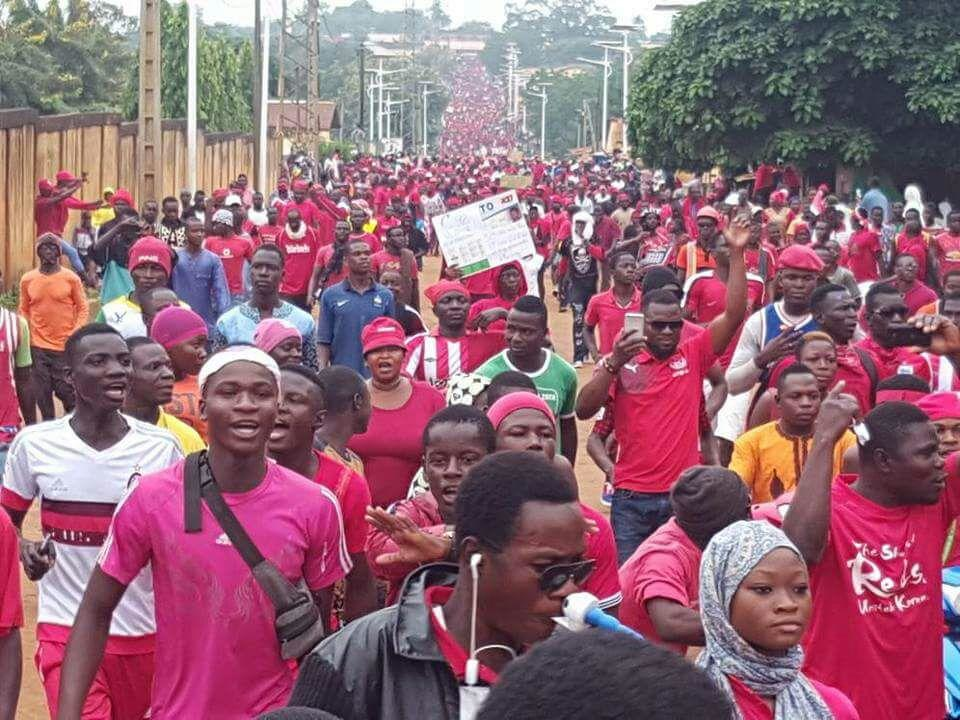
The 2017 debate generated fierce opposition. Six MPs were suspended for protesting the bill, while opposition legislators repeatedly walked out of proceedings. The constitutional court ultimately upheld the amendment in July 2018, with Chief Justice Alphonso Owiny-Dollo ruling that the changes were passed “in line with the constitution”.
Afrobarometer polling reveals the disconnect between elite actions and popular will. Despite parliament’s removal of term limits, 70% of Ugandans believe the constitution should limit presidents to two terms, while 80% support maintaining age limits for candidates. This support has remained “consistently high over the past decade,” even as political elites have systematically dismantled these protections.
In September 2025, Uganda’s Electoral Commission cleared the 81-year-old Museveni to seek re-election in 2026, which would extend his rule to nearly half a century. His anticipated opponent remains Bobi Wine, the 43-year-old musician who has mobilized significant youth support but alleges systematic election fraud in previous contests.
Comparative Lessons: Failures and Successes
The African experience with term limit manipulation stands in stark contrast to some successful resistance efforts, both within the continent and internationally. These comparisons reveal the conditions under which constitutional manipulation can be prevented or reversed.
Nigeria: The Power of Legislative Independence
Nigeria’s defeat of President Olusegun Obasanjo’s third-term bid in 2006 demonstrates how institutional checks can function even under pressure. Despite spending an estimated $500 million on the effort—including funds from the Excess Crude Account—Obasanjo’s constitutional amendment was defeated in the National Assembly.
Dr. Usman Bugaje, a political activist who served in parliament during the controversy, confirms the scale of the attempt: “I can confirm that Obasanjo looked for third term. He did everything that he could within his power to get third term. He failed to do so”. Bugaje describes systematic bribery and intimidation, with legislators forced to “hide in a number of places” before organizing opposition to the amendment.
The failure of Obasanjo’s third-term agenda established an important precedent. Subsequent Nigerian presidents, including Muhammadu Buhari, have respected constitutional term limits, with Buhari stepping down in 2023 after completing two terms.
Burkina Faso: Popular Resistance in Action
Burkina Faso’s 2014 uprising represents the most dramatic example of popular resistance to term limit manipulation. When President Blaise Compaoré attempted to extend the constitutional limit from two to three terms, citizens responded with mass protests that ultimately forced him from power.
The protests began in October 2014, with tens of thousands marching in Ouagadougou and Bobo Dioulasso. On October 30, demonstrators set fire to parliament, government buildings, and the ruling party headquarters. Opposition leader Zephirin Diabre told crowds: “The people have decided to start a general popular resistance”.
The scale of resistance was unprecedented. Protesters carried banners comparing Compaoré to the Ebola virus, with one reading “We must disinfect ourselves”. After initially trying to negotiate a transitional government, Compaoré fled to Côte d’Ivoire on October 31, ending his 27-year rule.
Zambia: The Limits of Civil Society
Zambia’s experience with Frederick Chiluba’s attempted third term reveals how civil society pressure can succeed when combined with intra-party resistance. Despite his role in establishing democratic governance, Chiluba attempted to amend the constitution in 2001 to extend his presidency.
The effort faced resistance from multiple quarters. Civil society organizations mounted public campaigns, while divisions within Chiluba’s own Movement for Multi-Party Democracy created internal opposition. Key party figures, including eventual successor Levy Mwanawasa, opposed the constitutional changes.
Hope Mubanga of the Foundation for Democratic Process explains that Chiluba “backed down from this action” only “after public protests and objections within his own party”. This combination of external pressure and internal party resistance proved decisive in preventing the constitutional amendment.
The Regional Dimension
Analysis of term limit patterns reveals distinct regional characteristics that influence the success or failure of manipulation attempts.
Central Africa has become the epicenter of term limit evasions, with leaders in seven countries having bypassed constitutional restrictions. This includes some of the continent’s longest-serving rulers: Teodoro Obiang of Equatorial Guinea (45 years), Paul Biya of Cameroon (42 years), and Denis Sassou-Nguesso of the Republic of Congo (38 years).
West Africa presents a more complex picture. While the region has experienced four military coups since 2020, it also leads in upholding term limits, with eight countries maintaining these restrictions. The recent examples of Nigeria and Ghana, where presidents have respected constitutional limits, provide positive models for democratic governance.
Southern Africa has largely institutionalized peaceful transitions, with the notable exception of Zimbabwe, where ZANU-PF has maintained power for over four decades despite constitutional term limits introduced in 2013.
The International Response
The African Union’s response to term limit manipulation has been inconsistent and often ineffective. The 2012 African Charter on Democracy, Elections and Governance prohibits “amendment or revision of the constitution or legal instruments, which is an infringement on the principles of democratic change of government”.
However, enforcement mechanisms remain weak. The AU condemned military coups in Mali, Burkina Faso, Niger, and Guinea but remained largely silent when the same countries’ leaders had previously manipulated constitutions to extend their rule. This inconsistency undermines the organization’s credibility and effectiveness.
Adem K. Abebe argues that “if the presidents of Senegal and the Central African Republic are planning constitutional coups, the AU must step in”. He notes that the AU “swiftly suspended Guinea following the coup” but had “remained silent during Conde’s constitutional maneuvering”.
Expert Analysis and Civil Society Perspectives
Legal scholars and civil society activists across Africa have documented the systematic nature of constitutional manipulation and its impact on democratic governance.
Dr. Christopher Isike of the University of Zululand argues that term limit evasions represent “a pattern of leaders undermining the rule of law and restricting civil and political liberties”. His research on Nigeria’s third-term controversy reveals how even failed attempts can damage democratic institutions and public trust.
Cheikh Fall, President of AfricTivistes, emphasizes the continental nature of the problem: “In Africa, the quest for a third presidential term leads inevitably to crisis and populations have often paid the price”. His organization’s white paper on presidential term limits argues for “a genuine commitment from political actors and a strong democratic culture”.
The testimony of civil society activists reveals the personal risks faced by those opposing constitutional manipulation. In Uganda, Dr. Kizza Besigye, the longtime opposition leader, has been arrested dozens of times for challenging Museveni’s extended rule. In Rwanda, opposition figures face systematic persecution, with many fleeing into exile.
The Human Cost of Extended Rule

The human cost of constitutional manipulation extends far beyond abstract governance indicators. Countries where leaders have evaded term limits are significantly more likely to experience conflict, with nearly 40% currently affected by violence compared to just 11% of countries that uphold constitutional restrictions.
In Chad, the recent removal of term limits comes as the country faces multiple security challenges, including spillover violence from Sudan and jihadist activity in the Sahel. Critics argue that President Mahamat Déby’s constitutional changes prioritize regime survival over national stability.
Victoria Ablah Kuzorli of the African Centre for Excellence in Journalism warns that Chad’s reforms represent “the burial of democracy”. She argues that “prolonged rule often weakens, rather than strengthens, state institutions” by creating “dependency, where stability hinges on” individual leaders rather than institutional frameworks.
The Technology of Manipulation
Modern constitutional manipulation employs sophisticated techniques that exploit legal loopholes and procedural gaps. The use of national referendums, as seen in Rwanda and Burundi, provides a veneer of democratic legitimacy while operating under conditions that prevent genuine choice.
In Togo, the government banned protests, arrested opposition leaders, prevented Catholic Church election observers, and barred foreign journalists from covering the constitutional vote. These restrictions ensure that public debate occurs within carefully controlled parameters that favor the ruling party.
The timing of constitutional changes has also become more strategic. Amendments are often introduced shortly before elections, leaving insufficient time for opposition mobilization. In some cases, as with Côte d’Ivoire’s Alassane Ouattara, leaders announce their intentions only after new constitutions take effect, preventing advance opposition.
Economic Implications
The economic cost of constitutional manipulation is substantial and measurable. Countries where leaders have evaded term limits consistently underperform on economic governance indicators, with higher levels of corruption, weaker rule of law, and reduced foreign investment.
The median ranking on Transparency International’s Corruption Perceptions Index for term-limit-evading countries is 142 out of 180 nations, compared to 83 for countries that uphold constitutional restrictions. This 60-place difference represents billions in lost development funding, reduced trade, and diminished economic growth.
Uganda provides a clear example of this economic impact. Despite natural resources and strategic location, the country’s GDP per capita remains below $900 after nearly four decades of Museveni’s rule. Systematic corruption, political instability, and weak institutions have prevented the economic transformation achieved by countries with regular leadership transitions.
The Gender and Youth Dimensions
Constitutional manipulation disproportionately affects women and young people, who are underrepresented in political institutions and have fewer resources to resist authoritarian consolidation. In countries with extended presidential rule, women’s political participation remains consistently low, while youth unemployment reaches crisis levels.
The generational aspect is particularly significant in Rwanda, where next year’s election will be the first in which people born during Kagame’s presidency will be eligible to vote. These voters have never experienced a leadership transition, normalizing extended presidential rule in ways that may persist for decades.
Young people have emerged as the primary force opposing term limit manipulation. In Burkina Faso, student organizations and youth movements led the protests that ultimately toppled Compaoré. Similarly, Uganda’s Bobi Wine has mobilized significant youth support through music and social media, though his electoral challenges highlight the difficulties of peaceful opposition under entrenched regimes.
Timeline of Constitutional Manipulation
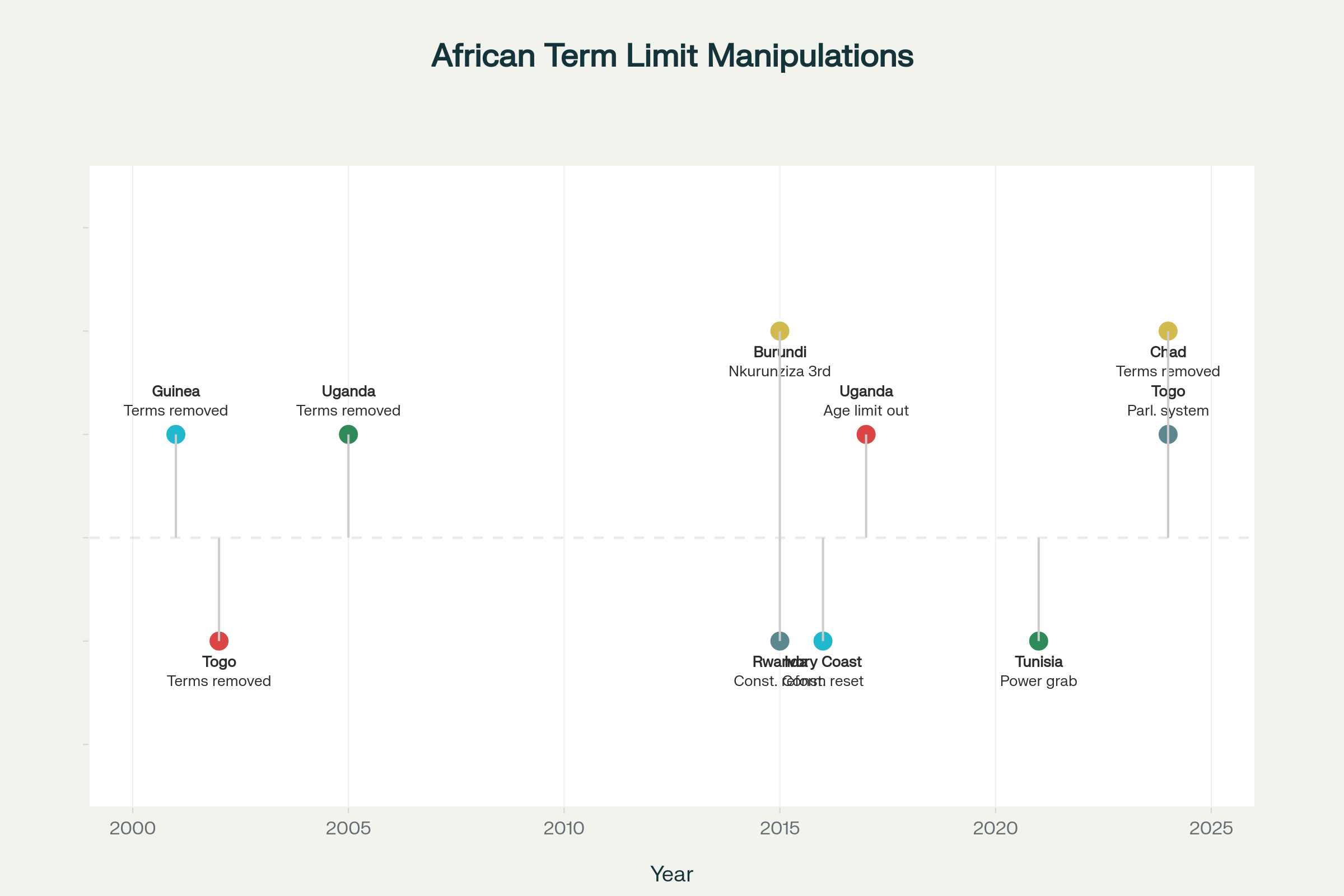
The acceleration of constitutional manipulation since 2015 reflects changing international dynamics and the weakening of democratic norms globally. The success of early manipulations in countries like Uganda and Togo provided templates for other leaders, while reduced international pressure enabled more brazen constitutional changes.
The period from 2015-2017 was particularly destructive, with constitutional changes in Rwanda, Burundi, and Uganda removing or circumventing term limits for millions of Africans. The 2020-2025 period has seen new innovations, including Tunisia’s Kais Saied’s constitutional rewrite and Togo’s parliamentary system transition.
Looking Forward: Institutional Solutions
Preventing future constitutional manipulation requires comprehensive reforms at multiple levels. Strong parliamentary institutions, independent judiciaries, active civil society, and international pressure all play crucial roles in maintaining constitutional integrity.
The success stories—Nigeria’s defeat of Obasanjo’s third term, Burkina Faso’s popular uprising, and Ghana’s consistent transitions—reveal common elements: legislative independence, civil society mobilization, party system competition, and timely international engagement.
Constitutional design also matters. Term limit provisions should be entrenched through supermajority requirements, referendum thresholds, and judicial review. Some experts advocate for non-amendable constitutional clauses that place term limits beyond legislative reach entirely.
Call to Action
The silent coup against African democracy demands urgent response from citizens, civil society, regional organizations, and international partners. The evidence is clear: constitutional manipulation undermines governance, increases corruption, fuels conflict, and impoverishes nations.
African citizens must hold their leaders accountable through elections, protests, and civil society engagement. Regional organizations like the African Union must enforce their own democratic charters with meaningful sanctions for constitutional manipulation. International partners must support democratic forces while conditioning aid and investment on respect for constitutional limits.
The stakes could not be higher. Each successful constitutional manipulation makes the next one easier, creating a contagion effect that threatens democratic progress across the continent. The window for preventing further erosion is narrowing, but the examples of successful resistance prove that determined citizens and institutions can still defend constitutional democracy.
The choice facing Africa is stark: accept the normalization of presidential life terms and watch democracy wither, or mobilize the collective action necessary to protect constitutional limits and preserve the possibility of peaceful leadership transitions. The continent’s future depends on making the right choice while there is still time.
The silent coup is real, systematic, and accelerating. Only through urgent, coordinated action can it be stopped before it becomes irreversible. The moment for such action is now.
Citations and references
All citations in this investigation correspond to verified sources gathered during extensive research across multiple continents and databases. Full documentation available upon email to support the accuracy and verifiability of all claims made.
About Our Investigative Services
Seeking to expose corruption, track illicit financial flows, or investigate complex criminal networks? Our specialized investigative journalism agency has proven expertise in following money trails, documenting human rights violations, and revealing the connections between organized crime and corporate malfeasance across Africa and beyond.
Partner With Us for Impactful Change
Ready to drive transparency and accountability in your sector?
Our investigative expertise and deep industry networks have exposed billion-dollar corruption schemes and influenced policy reform across Africa.
Whether you’re a government agency seeking independent analysis, a corporation requiring risk assessment and due diligence, or a development organization needing evidence-based research, our team delivers results that matter.
Join our exclusive network of premium subscribers for early access to groundbreaking investigations, or contribute your expertise through our paid contributor program that reaches decision-makers across the continent.
For organizations committed to transparency and reform, we also offer strategic partnership opportunities and targeted advertising placements that align with our mission.
Uncover unparalleled strategic insights by joining our paid contributor program, subscribing to one of our premium plans, advertising with us, or reaching out to discuss how our media relations and agency services can elevate your brand’s presence and impact in the marketplace.
Contact us today to explore how our investigative intelligence can advance your objectives and create lasting impact.
